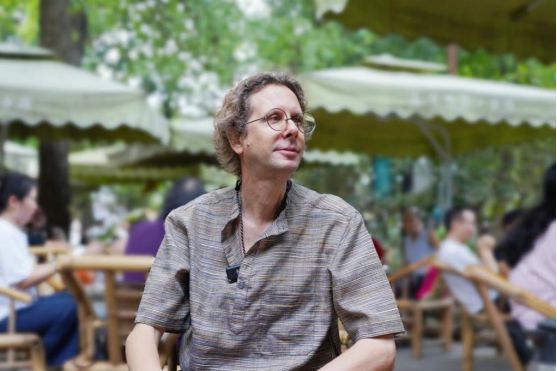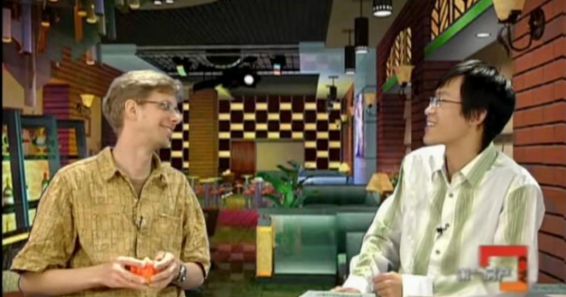Jiang Nan, whose English name is Jonathan, was born in Seattle, USA. He is the chairman of Chengdu Nannan Culture Communication Co., Ltd., and a cultural promotion media person. In 2005, he attracted public attention because of a program called Dao Ting Tu Shuo on Chengdu Radio and Television.
“Do you prefer ‘Su Mao Feng’ or ‘Hua Mao Feng’ tea?” In late September, with the heat of summer still lingering in Chengdu, the Global People journalist met Jiang Nan at an outdoor teahouse near Wenshu Monastery. Leaning back comfortably in a bamboo chair, he enthusiastically invited the reporter to join him for tea.
In the shaded teahouse, the crowd was chatting animatedly. Jiang Nan, engaging in a “Longmen Zhen” (Sichuan dialect for casual chatting) with the reporter, blended naturally into the lively atmosphere. If one ignored his golden curls and blue-green eyes, his voice could easily be mistaken for that of a native Chengdu resident.
This year marks the 26th year that this American has resided in Chengdu. In 1998, Jiang Nan flew from Seattle to Chengdu to study Chinese culture at Sichuan University. Seven years later, he stunned audiences as a foreign host on Dao Ting Tu Shuo, a popular Chengdu TV show, quickly gaining fame. Invitations to participate in various entertainment and food programs poured in, and he soon became a beloved figure among audiences.
After many years away from the screen, Jiang Nan now has transitioned to being a cultural promoter on social media. “I hope to bring more people to feel the charm of Chengdu's easygoing lifestyle.”

In September 2024, Jiang Nan was interviewed by Global People reporters in Chengdu. (Photo by Wang Boshuo)
A Chance Encounter with Chengdu
Jiang Nan’s bond with China began in his childhood. As a child, he lived with his warm-hearted grandparents in Hawaii, who often hosted international students in their home.
“My grandparents especially liked Chinese students because they were generally polite, hardworking, and easy to get along with,” Jiang Nan said. During time with these Chinese students, he shared Chinese meals and discussed Chinese culture with them. Through their stories, he developed a fascination for this ancient country across the ocean.
As he grew up, Jiang Nan was drawn to study Chinese culture. He majored in Chinese Culture, Anthropology, and Religious Studies at the University of Seattle. With each course, his desire to see the real China grew. In 1998, he finally received an opportunity to study at Sichuan University.
Initially, Jiang Nan planned to spend six months in the program and experience life in Chengdu for three years before returning to America. However, he fell in love with the city’s rich history, comfortable atmosphere, scenic beauty, and delicious food, extending his stay year after year.
“After arriving in Chengdu, my first fresh experience was celebrating the Spring Festival. A classmate invited me to celebrate at his house. That day, I had my first taste of Chinese beer and was dizzy after only two or three glasses,” he said with a smile. This encounter gave him his first taste of Chinese traditions and hospitality.
To blend seamlessly into the local life of Chengdu, Jiang Nan first tackled the language barrier. “I decided to go a whole year without speaking a single word of English, thinking entirely in Chinese.” Whenever he had free time, he would visit the teahouses around Wenshu Monastery, drinking tea and chatting with locals to improve his Sichuan dialect.
“The elderly often chatted about traditional Chinese medicine, wellness, and the history of Chengdu, which I found fascinating.” His approach was effective, as his Sichuanese improved rapidly. Soon after, his Sichuanese friends suggested he adopt a Chinese name.
“I thought ‘Jiang’ sounded similar to ‘Jon’ in my English name, and since Taoism values water, the surname ‘Jiang,’ which means river in Chinese, is particularly fitting. ‘Nan’ is often used as an ending in Sichuan dialect, and back then I spoke hesitantly, like muttering to myself. In Buddhism, ‘Nan’ symbolizes a gradual, patient approach to life, so I adopted ‘Nan’ as my name.”
The Foreign “Spice King” Shot to Fame
What truly kept Jiang Nan in Chengdu was his love for the local cuisine, especially his preference for spicy dishes.
“I grew up enjoying spicy food, so Sichuan cuisine suits my taste perfectly,” he said. This fondness for spicy flavors coincides with the “fiery” and dynamic character of Chengdu.
In 2005, Jiang Nan signed up for the “Spice King” contest at the Chengdu International Food Festival, a competition to see who could handle the most spice. Out of 2,000 contestants, he advanced to the top ten. In the final round, he had to eat 50 fresh capsicum frutescens in one go.

Jiang Nan often shows off his preference for spicy food on his program.
During the contest, he casually commented in Sichuanese, “My mouth is on fire!” This remark immediately caught the attention of over 20 media outlets on the spot. Just like that, he became “the Foreign Spice King.”
“At that time, there were few foreigners in Chengdu, even fewer who could speak Sichuanese, so many TV stations wanted to invite me on their shows.” This opened the door to his new career as a television host.
His screen debut was on Dao Ting Tu Shuo, a program that became almost a household name in Chengdu at that time.
“I initially didn’t know how popular the show was. After working for some time, one day I was heading to the TV station, standing by the roadside to catch a cab. People passing by stopped and said, ‘Hello, Nan!’, which is when I realized just how influential the show was.” After gaining some hosting experience, he shifted his focus to food shows, which allowed him to indulge in his passion for food while deepening his understanding of Chinese culture through the local culinary scene.

Jiang Nan used to be the host of Dao Ting Tu Shuo program in Chengdu Radio and Television.
“Sichuan cuisine is renowned for its diverse dishes with rich flavors, and Chengdu, as the Land of Abundance, has an ideal environment for fresh vegetables,” Jiang Nan said. In his view, food is one of the simplest and most direct ways of cultural exchange. Regardless of language barriers, delicious and healthy dishes are universally appreciated.
“My parents and friends back in the U.S. love hot pot. Now, every Christmas, whether I go home or not, they have hot pot. I even got them to try Sichuan peppercorn, and they were fascinated by its fragrance.” The longer Jiang Nan stays in Chengdu, the more his American family and friends’ tastes adapt.
Now, Jiang Nan has taken over an old house on Qinglong Old Street in Tianfu New Area, planning to open a vegetarian restaurant that innovates with Sichuan-style plant-based cuisine.
“I Haven't Found a Reason to Leave”
Besides dialect and cuisine, Jiang Nan enjoys exploring more aspects of Chinese culture.
“I have many masters! I study traditional Chinese medicine, learn martial arts and storytelling, and later apprenticed in calligraphy. The apprenticeship ceremonies in Chinese culture are exceptionally solemn, representing a unique traditional virtue of the Chinese people. It's not only about learning skills but also about gaining wisdom in life and integrating better into society.”
Jiang Nan’s numerous interests have led him to take a lighthearted approach to life, embracing “Shua Xi Qi” (Sichuan dialect for trying new things). In this spirit, he founded Nannan Cultural Communication Co., Ltd. in 2020 and launched a short video account to share his unique impressions of Chengdu with a wider audience.

Jiang Nan's short video account “The Journey of Nan” has gained a lot of fans.
“If friends come to Chengdu, I recommend Daci Temple, Wenshu Monastery, or Dujiangyan’s Ancient Town for a taste of traditional Chinese culture,” he said with a smile. “But if you really want to take something back, I think the best way is to stay for a while, pick a cultural activity, and experience it fully.”
Chengdu has become his second home, and he has witnessed its development over the years.
“In 1998, the second ring road had just been built, and Shuangliu Airport was a small terminal. Back then, I mostly got around by bike, car, or taxi. Now, there are subways, high-speed trains, and Chengdu Tianfu International Airport. The changes in transportation are incredible! The air is also cleaner, and the environment has improved. These details provide a direct impression of the transformations China has undergone since its reform and opening-up.”
Starting from Chengdu, Jiang Nan has explored the broader regions of China. In Xi’an, Shannxi, he marveled at the grandeur of the Terracotta Warrior. In Dunhuang, Gansu, the stunning murals captivated him. “In addition to modern infrastructure, China's dedication to preserving and studying its historical heritage is commendable.”
Reflecting on China's vastness and the unique and rich history, beauty, and cuisine of each city, Jiang Nan is full of enthusiasm for exploration. “That’s why I haven't found a reason to leave yet. In the past, people had about 100 TV channels; now, with social media, everyone can be a channel. I want my channel to be popular and will work hard to make it happen! I hope to produce more quality videos to let more foreigners experience the charm of China.”
(Zhang Linjia & Dong Shuo contributed to this story.)
 Editor:Li Peilin & Gao Weiyi
Editor:Li Peilin & Gao Weiyi